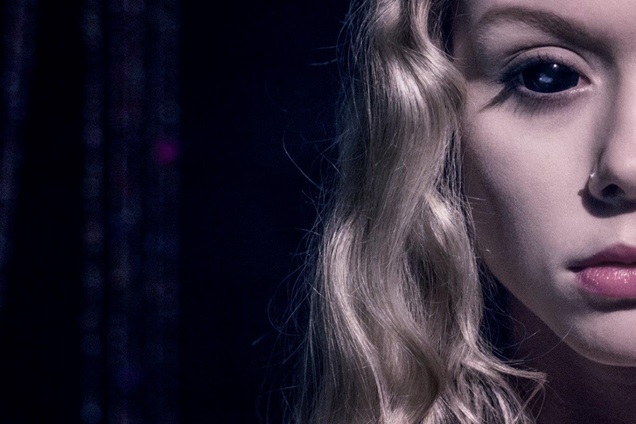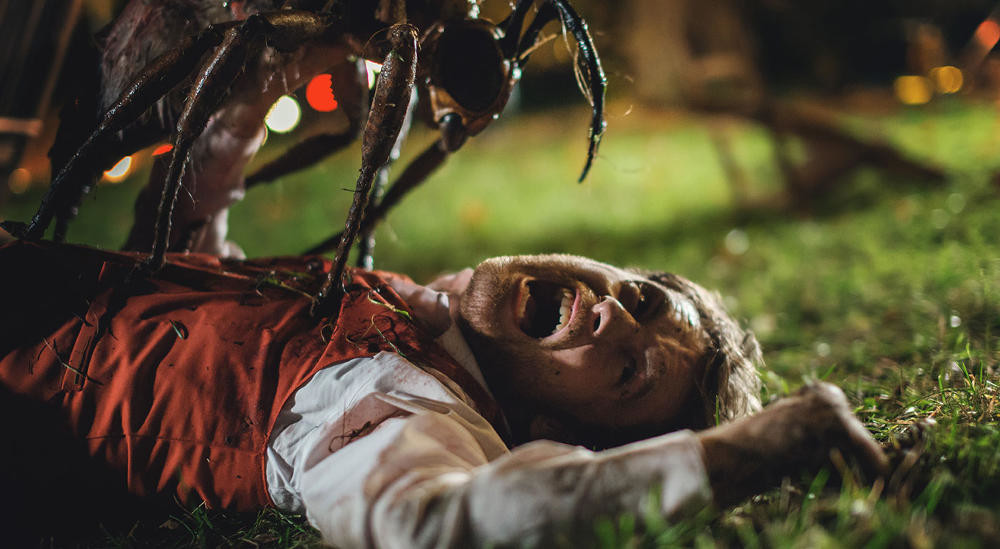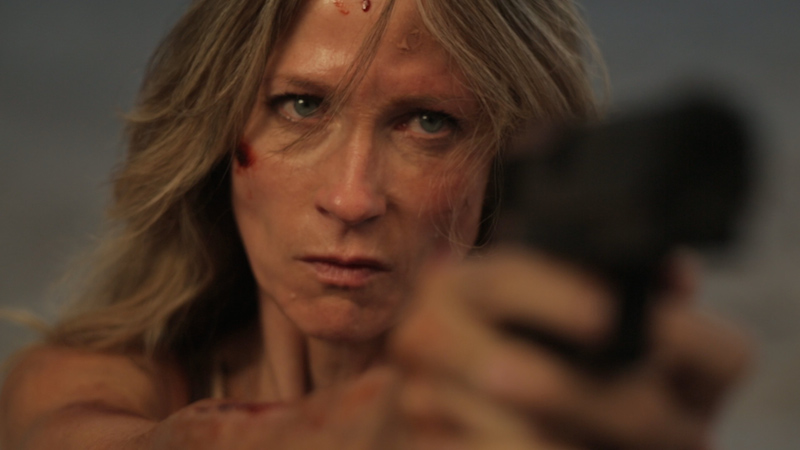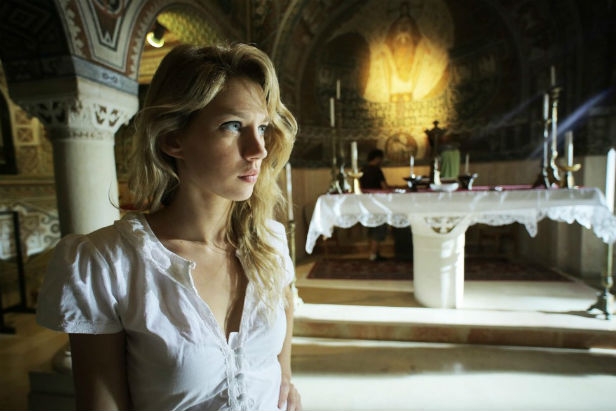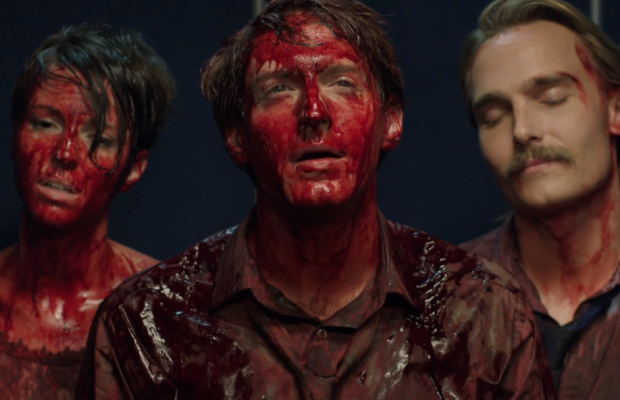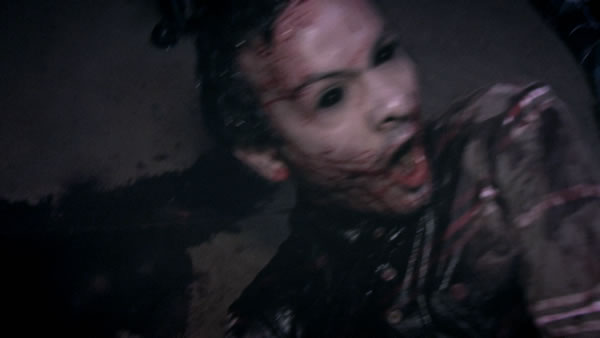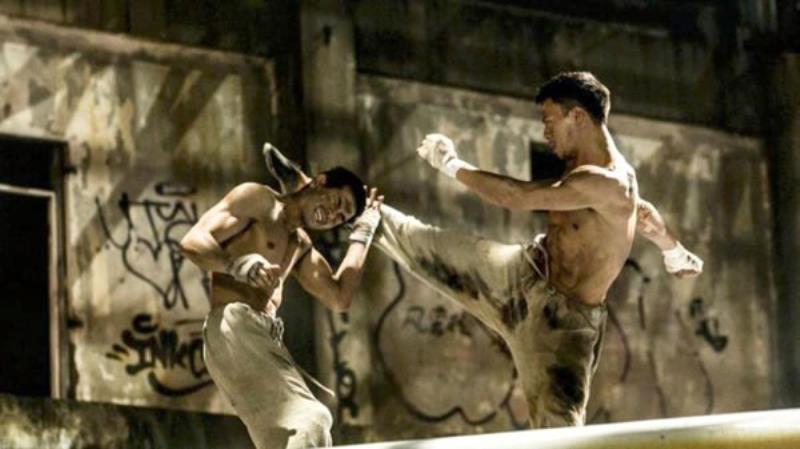FrightFest 2015 Dispatch: CHERRY TREE, THE UNFOLDING, NEVER LET GO, And More
So here we go again. FrightFest 2015 will present 76 features (and sundry shorts and special events) spread over six screens in four and a half days. It's the very best - and some of the worst - that (mostly independent) genre filmmaking from across the world has to offer at this very moment. It's also a gathering of the lost and the damned in London's Leicester Square to find themselves and each other over a long weekend of the wicked and the weird.
Now in its sweet sixteenth year, the Film4 FrightFest has come a long way, expanding from a simple, single-screen event into the rampaging behemoth that it is today, and atomising its audience across multiple theatres in keeping with the way that we watch films in the digital age. Some traditions, though, die hard, and this year's event, like so many others opened with a subpar British offering.









Cherry Tree
Where Irish director David Keating's previous feature Wake Wood (2011) showed a couple resorting to local supernatural powers to bring back their dead daughter, his latest, Cherry Tree, inverts these ideas, as teenaged Faith (Naomi Battrick) enters a Faustian pact to save her terminally ill father (Sam Hazeldine). The deal is that she must get impregnated on her 16th birthday and carry the baby to term for her new hockey coach Sissy (Anna Walton, wonderfully seductive and menacing), a local witch whose coven meets beneath the roots of a magic cherry tree.
On the one hand Cherry Tree concerns a virgin girl confronting the birth, sex and death that are part of adulthood via very literalised rites of passage, and embracing her own troubled maternity warts and all. On the other hand, it is an increasingly campy mash-up of motifs from Rosemary's Baby, The Craft, The Witches of Eastwick (cherries!), Nightbreed and even Kill List, with plenty of genre-voguish centipedes thrown in to serve as the witches' familiars.
So there is a lot going on here, but at the same time there is a superabundance of exposition (in introductory text, character-given commentary and even a class presentation) that undermines any uncanniness by trying to make too much sense of everything. You may go into Cherry Tree hoping for the baroque irrationality of Dario Argento's Suspiria (1977), the stylised mother of all witchcraft movies, but what you get instead is something closer to the shrill silliness of Suspiria's belated second sequel The Mother of Tears (2007). Cherry Tree lacks the subtlety that its coming-of-age themes demand.
Stung
"What is a bee's favourite movie?" Paul (Matt O'Leary) asks his boss - and the object of his affections - Julia (Jessica Cook). "Stingin' in the Rain," is the eventual answer that Paul gives, conceding, "I know it's a dad joke - but I like it."
This is about the level of humour in Benni Diez's German/American co-production Stung, which though focused on giant mutant wasps, is decidedly a 'bee' movie. Set at a society party in the country which Paul and Jenny have been hired to cater, it begins as a class-clash romantic comedy before turning into icky body horror as wasps fed on growth hormones start attacking the guests, producing monstrous human-sized wasps and transforming the mansion into a giant nest.
The caterers are joined in their fight against their new insect overlords by the local Mayor cum Korean War vet - played by Lance Henriksen, whose involvement seems entirely designed to clinch a later allusion to Aliens (1986), as a big mother's babies are used as bargaining chips.
Everything here is underdone and overstretched, with half-assed vomit and shit jokes as though the film cannot quite commit to its own puerility, and a very light splattering of Oedipal social satire to pad things out (as the mansion owners find their inner WASPishness). The two leads keep things ticking over more through their own charisma than anything in the perfunctory script - and the low-grade CGI makes the wasps look like a swarm of hyperactive pixels. If Stung leaves you with surface irritation, probably best not to scratch it.
The Unfolding (World Première)
Against a backdrop of impending global nuclear war, graduate paranormal investigator Tam (Lachlan Nieboer) and his girlfriend Rose (Lisa Kerr) head to an isolated fourteenth-century property in Dartmoor. Their aim is to stay one night and detect any unusual activity with a panoply of cameras and other devices, but as things very much go bump in the night and a presence makes itself felt, the couple stays on, soon joined by geophysicist friend Harvey (Nick Julian), by Tam's professor Chessman (Robert Dawg), and even by the medium Muriel (Kitty McGeever).
At one point in the unfolding of this microbudget labour of love, Chessman reveals to Harvey that while he has a strong interest in the paranormal, his academic field is actually astronomy. This detail, in a way, encapsulates the divided loyalties of writer/director Eugene McGing's feature debut, which conjures a world not so very far in the future (2016, to be exact) on the brink of mutually assured destruction, while also moonlighting as a 'found footage' ghost story pieced together from Tam's cameras and the house's external CCTV.
The house is certainly spooky, and amidst all the overstretched panic and running about that typify this subgenre, there are some real frights (generated mostly from the excellent audio). Yet it is debatable whether these two parallel storylines - the one involving a good ghost and an evil phantom, the other the spectre of nuclear annihilation - ever meet in any coherent or compelling way.
Never Let Go (World Première)
Bereaved, pill-popping Lisa Brennan (Angela Dixon) is taking a much-needed holiday in an unnamed North African country when a gang of Eastern European men abducts her baby girl, not realising that the mother they have targeted comes with a special set of skills - and so Lisa gives chase with extreme prejudice, leaving bodies in her wake, while evading a local police force that doubts she even has a daughter.
Never Let Go takes the ripped-from-the-headlines parental anxieties raised by the 2007 disappearance of Madeleine McCann and plays them out like Flightplan (2005) in a medina quarter, or a gender-reversed take on Taken (2008). Its heroine wins over our sympathies with her maternal pertinacity, while simultaneously losing them with her habit of severely injuring, or even murdering, anybody who gets in her way (including a cab driver who has the audacity to want payment for the use of his car). Given all this genuinely shocking collateral damage, and Lisa's connections to a Republican politician back home in New York, one might just about discern, in her righteously violent and vengeful hunt through an Arab setting, an allegory of the US's clumsy post-9/11 adventurism abroad - although where exactly this will get you is anyone's guess.
Howard J. Ford's previous writing-and-directing collaborations with his brother Jon - The Dead (2010) and The Dead 2: India (2013) - both featured white male protagonists who, though out of their depth in beautifully shot 'exotic' locations, still manage to teach the swarthy locals a lesson or two in undiplomatic ass-kicking. This, Howard's first solo outing, follows a similar formula while switching sexes. Consequently, Lisa's foreign incursions still come with an uncomfortably colonialist feel, but also represent a new assault on local (as well, it turns out, as American) patriarchy. Here, as with a Rambo sequel, the text is clear while the subtext (on race, gender and geopolitics) remains murky and misconceived. The action, however, is very well done.
Jeruzalem
In Marc Forster's World War Z (2013), the Jerusalem sequence - which was in fact not even shot in Jerusalem - offered a clumsily Islamophobic allegory of local politics for an American audience, with its zombies figured as monomaniacal Middle Eastern hordes trying to break though a giant encircling barrier reminiscent - and resonant - of the controversial Wall that is already there.
Jeruzalem, directed by the Paz brothers (Doron and Yoav), goes to considerable lengths to redress this, by bringing three American tourists to the real Jerusalem where Jew, Muslim and Christian are seen - however uncomfortably - to coexist, and where the undead are creatures from the Old Testament and the Talmud.
Americans Sarah (Danielle Jadelyn), Rachel (Yael Grobglas) and Kevin (Yon Tumarkin) go on a holiday to Israel, where, after much drinking, drug taking and sex, they are confronted with an apocalyptic event in Jerusalem that may just mark the Judgement Day, when all the good deeds and sins of humanity are weighed. Jeruzalem opens with some basic 'found footage' shot in 1976, before cutting to the present, where everything is shown, POV-style, through Sarah's high-tech 'Smart Glasses'. This allows for some ingenious storytelling techniques, as Sarah's perspective can constantly be enhanced with social media data, wiki pages, Skype conversations, maps, and even an ironised series of text messages from daddy as we watch his sweet little girl mounted naked on Kevin. If the first use to which Sarah puts her glasses is to play a bloody first-person-stabber horror VG superimposed on the rooms of her own home, this will eventually become a very different, if no less horrific reality in Jerusalem, with far graver consequences.
There is too much subjectivised sightseeing and meandering character business in the first two acts, which will have most viewers aching for at least a little bit of armageddon - but once the Resurrection has finally commenced, the Nephilim have begun walking the earth and the Dark Angels have started spreading their wings, all hell breaks loose, and millennia of religious and racial tensions are given a postmodern Bibilical form. Best of all, the directors revealed in the Q&A that they were granted permission to shoot in so many of Jerusalem's sacred sites by authorities who believed they were making a documentary, with the CG monsters added in later as a dark underside to the city's already complex reality.
Bloodsucking Bastards
Industrious, dedicated but wishywashy, Evan (Fran Kranz) wishes he had replied 'yes' instead of 'no' after his girlfriend Amanda (Emma Fitzpatrick), from Human Resources, declared her love to him. When the floor boss Ted (Joel Murray) brings in Evan's old college rival Max (Pedro Pascal) and promotes him over Evan to manager, things in the firm start changing fast, as previously inefficient workers start adopting a more cutthroat approach to telesales. Yet with a deadline looming for a report on a male enhancement pill (a reflex on our hero's fragile masculinity), only Evan and Amanda seem unaware of the undead menace that has taken over the office.
Pitched somewhere between Office Space (1999), Drones (2010) and Stalled (2013), Brian James O'Connel's Bloodsucking Bastards is a corporate comedy where the new-hires are also vampires, but remain, for all the occasional big-stake takeovers or explosions of blood, more like metaphors for a certain model of middle management. With plenty of shrewd satirical observations on the life of a desk jockey, as well as the odd surreal digressions ("whimsical gimp mask"), and a final, bloody battle with the 'puncture monkeys' that somehow includes a game of 'rock paper scissors', Bloodsucking Bastards stands out from the competition by focusing on a collection of disgruntled, dysfunctional characters, and making the vampiric status of some of them a near irrelevance. For when Ted tells Evan, "The methods might seem a little unorthodox, but you can't argue with the results," he may as well be talking about this charmingly eccentric film.
The Entity
In search of a topic for their documentary, some students get drawn to a film reel in a cemetery which supposedly causes its viewers to be killed by a demonic creature. As the students first watch online other people's horrified 'reaction videos' to the film, and then track down the original reel and record themselves watching it, they come to realise that they are not merely investigating but also helping to disseminate a supernatural female vendetta dating back to a clerical outrage during the Inquisition - and that their fate is already sealed.
Not to be confused with Sidney J. Furie's 1982 demon-rape film of the same title, The Entity (La Entidad) is Peru's found-footage answer to the cursed videotape of Ringu (1998) - from a director (Eduardo Schuldt) more usually associated with animated children's features. While The Entity falls into many of the worst traps of shakicam vérité - terrible 'naturalistic' dialogue, mediocre acting, dull characterisation, and lots of terrified (if not quite terrifying) running about - it keeps things varied by mixing in CCTV and Skype footage, and plays interesting games with the notion that media-born hauntings (this one originally spreading itself via an old, rarely read tome) have never had it better than in our age of digital communications and easy duplication. There is a neatly reflexive anxiety attached to the notion that watching a film, and in particular this film, can be very, very bad for the viewer - although a last-act twist distracts from this, while adding little.
The Sand (World Première)
The morning after a night of hardy partying on a secluded beach, several co-eds awaken not just to the usual hangovers, erotic regrets, post-prank headaches and relationship recriminations, but also to the realisation that all their other friends have mysteriously vanished, and that, beneath the sand that surrounds them, something unseen and hungry is waiting. And so, amidst bitching and bickering, they are forced to take a few premature steps closer to the death that all their adolescent promise has so far kept at bay. In this littoral setting between land and sea, we witness the confrontation of youth and eternity, see nubile skin peeled from bone, and are not sure whether to laugh or cry (well, ok, we're pretty sure it's laugh) as crapulous, overweight Gilbert (Cleo Berry),"stuck in a goddam trash can" as part of a practical joke from the night before, must face the prospect of dying with a penis still drawn on his face.
Where Harmony Korine's Spring Breakers turned the ephemeral rites de passage of horny, drugged-up college students into a melancholic mantra of excess and mortality, from the same essential ingredients Isaac Gabaeff's The Sand weaves a dumb-assed creature feature that feels like the director's calling card for future work with the SyFy Channel or The Asylum. Think Blood Beach (1981) or Sand Sharks (2011), except with the focus, presumably for budgetary reasons, less on the"jelly fish x1000" below, and far more on a band of gormless, uninteresting characters whom we secretly long to watch becoming monster fodder rather than seeing them in their adult years. They squabble, engage in silly sausage-tossing exercises, and struggle in vain to carry out the most basic of activities without being able so much as to touch the ground, all to a hilariously over-the-top Hitchcockian score by Vincent Gillioz. Yet even as what lies in wait beneath may surface as a venomous bioluminescent bundle of Lovecraftian tentacles, it is also the doom that eventually, inevitably awaits all tender flesh. Or as one gormlessly lovesick partygoer (Meagan Holder) says of her holiday fling, grimly aware how fleeting is the spring(break)time of existence: "I wanted the fairytale even if it was just for a minute."
Zombie Fight Club
"I didn't sign up for this shit!", shouts the special forces cop who thought he had entered a building to bring down a heavily armed drug gang, but now finds himself under attack from hordes of ravenous undead. Viewers may feel the same way - if, that is, they are unaware of Joe Chien's 2010 Zombie 108 ("Taiwan's first zombie movie!", and then some), around whose apocalyptic viral outbreak this follow-up is also set - and if, moreover, they have failed to perceive the genre-blending madness promised by a title like Zombie Fight Club. Still present and correct are Chien's fetishistic love of female tits and ass (and mouth), of misogynistic, murderous men, and of creatively gratuitous gore - and he is not afraid to take a large apartment block in Taipei and show, over the course of the film's first two thirds, almost every single resident and guest alike being bloodily slaughtered.
Yet after an hour of this zombified reimagining of The Raid (2011), Chien leaps out of the building, jumps a year ahead and thrusts us into an entirely different film. Now Taipei has become a post-apocalyptic penitentiary of patriarchal perversity, where imprisoned survivors do gladiatorial battle with zombies in a Thunderdome-like arena at the whim of a former mild-mannered science teacher turned rape-happy S&M dungeonmaster and his harem of women in black bondage gear.
The results are a tone-deaf, tasteless mess, with comedy that never quite seems to hit its mark, dialogue that is at best perfunctory, and action (choreographed by Philip Ng) that is off any and every scale. Zombie Fight Club is a problematic cavalcade of uncomfortable male fantasies (and their punishment), but there is something to its anything-goes insanity that proves irresistibly infectious, especially at the midnight hour. And for those who like a bit of subtextual bite to their undead, the film does preach the perils of American-imported bath salts (which are the source of the outbreak) - although it also leaves the impression that the filmmakers may have taken a few too many of these on-set themselves.

More about Cherry Tree
More about Stung
- BiFan 2015 Review: STUNG's Bite Quietly Fades Away
- Fantaspoa 2015 Dispatch: Award Winners Include STUNG And THE INCIDENT
- Neuchâtel 2015 Welcomes Chris Carter, DEATHGASM, EXCESS FLESH, STUNG, And More
- Fantaspoa 2015: First Wave Of Films Includes SCHERZO DIABOLICO, TURBO KID And More!
- STUNG: Giant Mutant Wasps Wreak Havoc In The International Trailer!
Around the Internet
Recent Posts
Friday One Sheet: LIVING THE LAND
Now Playing: BLADES OF THE GUARDIANS and Some Other Movies
Leading Voices in Global Cinema
- Peter Martin, Dallas, Texas
- Managing Editor
- Andrew Mack, Toronto, Canada
- Editor, News
- Ard Vijn, Rotterdam, The Netherlands
- Editor, Europe
- Benjamin Umstead, Los Angeles, California
- Editor, U.S.
- J Hurtado, Dallas, Texas
- Editor, U.S.
- James Marsh, Hong Kong, China
- Editor, Asia
- Michele "Izzy" Galgana, New England
- Editor, U.S.
- Ryland Aldrich, Los Angeles, California
- Editor, Festivals
- Shelagh Rowan-Legg
- Editor, Canada


